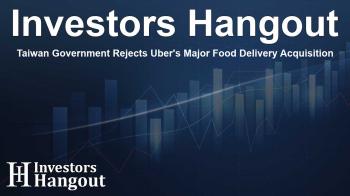Taiwan Government Rejects Uber's Major Food Delivery Acquisition

Taiwan Government Steps In Against Uber's Major Acquisition
Taiwan has taken a firm stance by blocking Uber Technologies' (NYSE: UBER) ambitious $950 million acquisition of Delivery Hero's Foodpanda business. This decision stems from concerns regarding potential anti-competitive behavior, as reported by Bloomberg News citing the Central News Agency (CNA) of Taiwan.
Concerns Over Competition in the Market
The Taiwanese authorities are particularly vigilant about maintaining a fair competitive landscape in the food delivery sector. The decision indicates a growing trend of regulatory scrutiny around major mergers and acquisitions, especially those that could potentially dominate market share and limit consumer choices.
Background of the Proposed Acquisition
The announcement about the acquisition was made back in May, a bold move that Uber hoped would strengthen its foothold in the food delivery market. This deal was not just about Foodpanda; it also included a separate arrangement for Uber to acquire $300 million worth of newly issued shares of Delivery Hero.
Responses from Involved Companies
As the news broke, neither Uber nor Delivery Hero were immediately available for comment, which highlights the challenges such companies face in maintaining transparency and communication during regulatory processes. It’s common for companies to limit their comments outside of designated business hours.
What This Means for Uber's Future in Taiwan
The blockage of this deal sends a clear message about the importance of regulatory approvals for similar expansions. For Uber, this could signify a need to reassess their strategies not only in Taiwan but across other markets where competition laws are stringent.
The Future of Food Delivery Services
Looking forward, the food delivery service sector may continue to evolve. Various companies will have to navigate these regulatory landscapes carefully, ensuring compliance while innovating and expanding their offerings to customers. The potential for competition remains high, and strategic partnerships could become crucial in overcoming such barriers.
Frequently Asked Questions
What led to Taiwan blocking Uber's acquisition of Foodpanda?
The blocking was due to anti-competitive concerns that might harm market fairness and consumer choices.
What was the value of the proposed acquisition?
Uber's proposed acquisition was valued at $950 million.
What other deal was included in Uber's acquisition?
The acquisition also included a separate agreement for Uber to purchase $300 million worth of shares in Delivery Hero.
Why is regulatory approval important for acquisitions?
Regulatory approval is crucial to ensure fair competition, prevent monopolistic practices, and protect consumer interests.
How could this move impact Uber's future in the food delivery market?
This outcome may prompt Uber to rethink its strategies for growth in Taiwan and potentially other markets with similar regulatory environments.
About Investors Hangout
Investors Hangout is a leading online stock forum for financial discussion and learning, offering a wide range of free tools and resources. It draws in traders of all levels, who exchange market knowledge, investigate trading tactics, and keep an eye on industry developments in real time. Featuring financial articles, stock message boards, quotes, charts, company profiles, and live news updates. Through cooperative learning and a wealth of informational resources, it helps users from novices creating their first portfolios to experts honing their techniques. Join Investors Hangout today: https://investorshangout.com/
Disclaimer: The content of this article is solely for general informational purposes only; it does not represent legal, financial, or investment advice. Investors Hangout does not offer financial advice; the author is not a licensed financial advisor. Consult a qualified advisor before making any financial or investment decisions based on this article. The author's interpretation of publicly available data shapes the opinions presented here; as a result, they should not be taken as advice to purchase, sell, or hold any securities mentioned or any other investments. The author does not guarantee the accuracy, completeness, or timeliness of any material, providing it "as is." Information and market conditions may change; past performance is not indicative of future outcomes. If any of the material offered here is inaccurate, please contact us for corrections.
